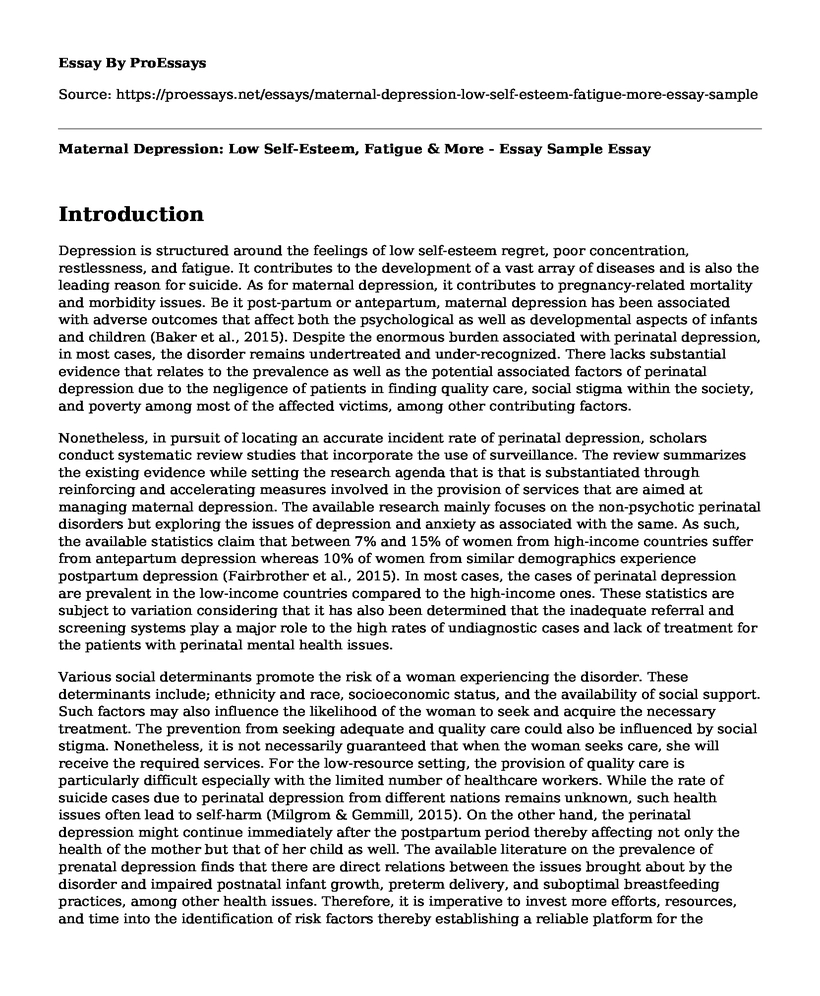Introduction
Depression is structured around the feelings of low self-esteem regret, poor concentration, restlessness, and fatigue. It contributes to the development of a vast array of diseases and is also the leading reason for suicide. As for maternal depression, it contributes to pregnancy-related mortality and morbidity issues. Be it post-partum or antepartum, maternal depression has been associated with adverse outcomes that affect both the psychological as well as developmental aspects of infants and children (Baker et al., 2015). Despite the enormous burden associated with perinatal depression, in most cases, the disorder remains undertreated and under-recognized. There lacks substantial evidence that relates to the prevalence as well as the potential associated factors of perinatal depression due to the negligence of patients in finding quality care, social stigma within the society, and poverty among most of the affected victims, among other contributing factors.
Nonetheless, in pursuit of locating an accurate incident rate of perinatal depression, scholars conduct systematic review studies that incorporate the use of surveillance. The review summarizes the existing evidence while setting the research agenda that is that is substantiated through reinforcing and accelerating measures involved in the provision of services that are aimed at managing maternal depression. The available research mainly focuses on the non-psychotic perinatal disorders but exploring the issues of depression and anxiety as associated with the same. As such, the available statistics claim that between 7% and 15% of women from high-income countries suffer from antepartum depression whereas 10% of women from similar demographics experience postpartum depression (Fairbrother et al., 2015). In most cases, the cases of perinatal depression are prevalent in the low-income countries compared to the high-income ones. These statistics are subject to variation considering that it has also been determined that the inadequate referral and screening systems play a major role to the high rates of undiagnostic cases and lack of treatment for the patients with perinatal mental health issues.
Various social determinants promote the risk of a woman experiencing the disorder. These determinants include; ethnicity and race, socioeconomic status, and the availability of social support. Such factors may also influence the likelihood of the woman to seek and acquire the necessary treatment. The prevention from seeking adequate and quality care could also be influenced by social stigma. Nonetheless, it is not necessarily guaranteed that when the woman seeks care, she will receive the required services. For the low-resource setting, the provision of quality care is particularly difficult especially with the limited number of healthcare workers. While the rate of suicide cases due to perinatal depression from different nations remains unknown, such health issues often lead to self-harm (Milgrom & Gemmill, 2015). On the other hand, the perinatal depression might continue immediately after the postpartum period thereby affecting not only the health of the mother but that of her child as well. The available literature on the prevalence of prenatal depression finds that there are direct relations between the issues brought about by the disorder and impaired postnatal infant growth, preterm delivery, and suboptimal breastfeeding practices, among other health issues. Therefore, it is imperative to invest more efforts, resources, and time into the identification of risk factors thereby establishing a reliable platform for the development of relevant intervention measures that women experiencing such mental health issues can be screened, diagnosed, and properly treated.
References
Baker, R., Orton, E., Kendrick, D., & Tata, L. J. (2015). Maternal depression in the 5 years after childbirth among women with and without perinatal depression: a population-based cohort study. The Lancet, 386, S22.
Fairbrother, N., Young, A. H., Janssen, P., Antony, M. M., & Tucker, E. (2015). Depression and anxiety during the perinatal period. BMC psychiatry, 15(1), 206.
Milgrom, J., & Gemmill, A. W. (2015). Identifying perinatal depression and anxiety. West-Sussex: Wiley Blackwell.
Cite this page
Maternal Depression: Low Self-Esteem, Fatigue & More - Essay Sample. (2023, Apr 23). Retrieved from https://proessays.net/essays/maternal-depression-low-self-esteem-fatigue-more-essay-sample
If you are the original author of this essay and no longer wish to have it published on the ProEssays website, please click below to request its removal:
- Essay Sample on Myopia and ADHD
- Essay on Jesus on Anger: Hatred Equals Murder in Christian Beliefs
- Essay Sample on John Locke's Theory Of Personal Identity
- Essay Example on Big Little Lies: Therapy & Mental Health in an Upscale California Town
- Paper Example on My Nature Escapades: Exploring Waterfalls for Stress Relief
- Essay Example on Global Healthcare Stressors: Strategies for Administration and Nursing Shortage
- Essay Sample on Psychosocial Factors Impacting Health Care Professional Wellbeing & Patient Education







